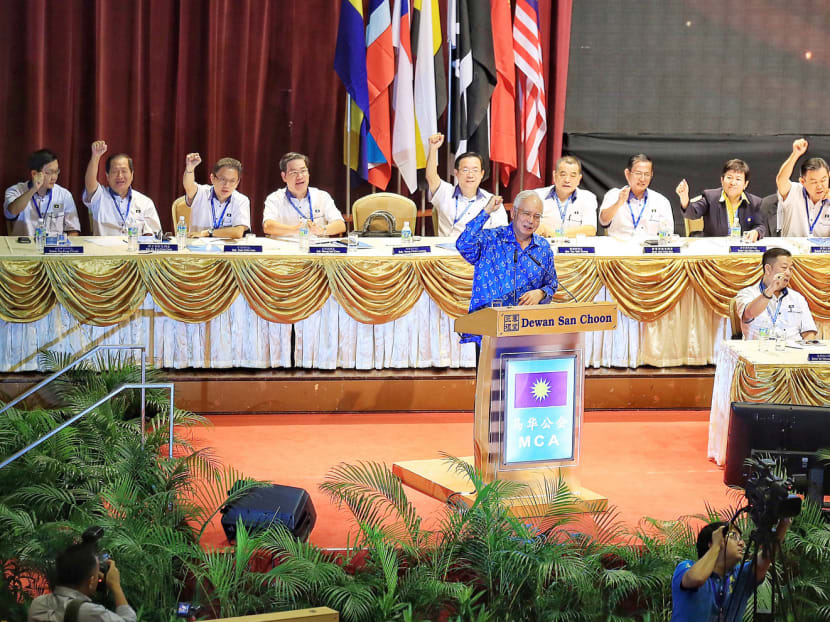Najib tells Chinese voters that support is a two-way street
KUALA LUMPUR — Malaysian Prime Minister Najib Razak sought to reach out to ethnic Chinese voters yesterday by pledging to “do more” for the community should they support the ruling Barisan Nasional (BN) coalition.

Mr Najib Razak speaking at the opening of the Malaysian Chinese Association’s annual general assembly yesterday. Photo: The Malay Mail
KUALA LUMPUR — Malaysian Prime Minister Najib Razak sought to reach out to ethnic Chinese voters yesterday by pledging to “do more” for the community should they support the ruling Barisan Nasional (BN) coalition.
“You must show support. If you show support we have no problem giving more. But you must come forward to support me. If not I’ll get the heat,” said the BN chairman at the Malaysian Chinese Association (MCA) annual general assembly.
“They will say, you give them so much, but then they never support you. This is difficult lah,” he added, referring to the main Malay base in BN’s dominant party, United Malays National Organisation (UMNO).
His comments come amid racial tensions after ethnically charged demonstrations in downtown Kuala Lumpur recently put the country on edge.
As it is, the Malay right wing has called on Mr Najib to drop efforts to win back ethnic Chinese after the community voted overwhelmingly for the opposition in the 2013 general election, leading to looser ties between the country’s two major races as the UMNO president focused more on bolstering support in his party’s main Malay voter base.
At MCA’s event yesterday, Mr Najib sought to close that gap by reaching out to the Chinese community and also backing the MCA in his speech by taking a swipe at criticisms from the opposition.
“They say MCA is a silent party. This is not true. They are not a silent party. In fact they have spoken up on many issues … the yellow shirts, the red shirts, Low Yat incident or 1MDB, you name it. They have spoken about it in cabinet or BN meetings,” he said. “The only difference is they did it politely. Not rudely.”
The ruling Chinese party’s political foe, the Democratic Action Party, have repeatedly called MCA “spineless” for allegedly failing to speak up on controversial issues involving UMNO.
While MCA dismissed the allegation as untrue, the perception stuck with the community and contributed to MCA’s declining influence. In the last general election, MCA only won seven federal and 11 state seats, half of what it garnered in election 2008.
Mr Najib had repeatedly said since then that MCA has to work harder to regain Chinese support, but some MCA leaders said this would be impossible due to UMNO’s tendency to ride on race politics in order to win votes.
Yesterday, Mr Najib reiterated that MCA needs to “show more” and “respond” to his plea to get the Chinese back into BN’s fold.
“If you want more seats you need to get Chinese support … you have to show, respond to it. And it must not only be in words but in action,” he said.
Analysts contacted by TODAY were critical of Mr Najib’s comments yesterday, saying that his overtures to Chinese voters were all but superficial.
“He is doing what is expected ceremoniously of him to boost support for MCA. It would be naive to think he means anything in his message that all ethnic groups need each other,” said head of political and social analysis at think-tank Penang Institute, Wong Chin Huat.
Mr Ooi Kee Beng, deputy director of ISEAS-Yusof Ishak Institute, said Mr Najib was “parroting the traditional BN narrative in his speech”.
“He is the PM. He can appeal directly to Chinese voters instead of trying to do it through a BN party that has obviously lost almost all support from the Chinese ground,” he said.
A former political aide to Mr Najib said that his message to Chinese voters will probably meet with “an equal if not stronger expectation for the ruling coalition to instead make the first move in favour of some of the longstanding demands of the Chinese community, before they are willing to revert somewhat to supporting BN”.
“So it is a chicken and egg scenario, with each side expecting the other side to make the first move before reciprocating,’’ said Dr Oh Ei Sun, now a senior fellow at the S Rajaratnam School of International Studies. AGENCIES, with additional reporting by Jason Tan






